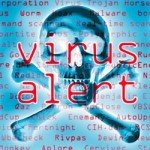 A computer virus is basically a program which enters and gets installed on your computer and which can simultaneously execute or run on its own when a specific type of file is clicked. A virus can enter a computer either when you receive an email or you transfer a file, which is infected from one computer to the other.
A computer virus is basically a program which enters and gets installed on your computer and which can simultaneously execute or run on its own when a specific type of file is clicked. A virus can enter a computer either when you receive an email or you transfer a file, which is infected from one computer to the other.
The effect of a virus can be fatal to the machine to the extent that it gets damaged, files can be deleted, corrupted, boot sector over–ridden and hard drives could stand formatted. A virus would be generally a program which either executes on its own or asks for execution such as an exe, SYS, OVL, OBJ, PRG, MNU and BAT files.
Generally a virus would be attached along with legitimate program and would execute as soon as a genuine program is executed. This is done so that the user is not aware about the virus getting executed and in the meantime the virus would have done its part.
Many times a virus changes its code on its own when it moves from one computer to other. This is done so that user is not able to make the virus ineffective.
In India generally W32/Coronex-A viruses are found which will affect the address book and start phishing mails or fraudulent mails and fool other users.
Various types of Computer Viruses are:
1. Resident virus: These are the viruses which reside in your PC’s RAM. These viruses end up corrupting various programs that are installed and running on your machine.
2. Boot Virus: These viruses reside on the boot sector of your hard drive and thus it affects the operating system.
3. File Virus: These affect the .exe files to which they get attached.
4. Multipartite Virus: These viruses are a combination of Boot and File Virus. These viruses cause maximum infection to the machine since they affect both the boot sector of the hard drive as well as the files stored on the PC.
5. Network Virus: This is the virus which spreads through LAN and via Internet.
6. E-mail Virus: This virus gets attached to all the contacts in your Email list and it spreads once the mail is opened and viewed.
7. Macro Virus: All programs like MS Office that use macros get infected by this virus. These viruses are operating system independent meaning they can affect any system irrespective of the operating system it uses.
There are various anti-viruses and firewalls that have come up to counter affect these viruses and stop them from attacking your PC. Some of the common and most widely used are BitDefender, Norton, F-Secure, ESET NOD32, Kaspersky, TrendMicro, Panda, AVG, McAfee, ZoneAlarm and GData. The best way to protect your PC is to use a good anti-virus program that is updated regularly and simultaneously use a good firewall too.